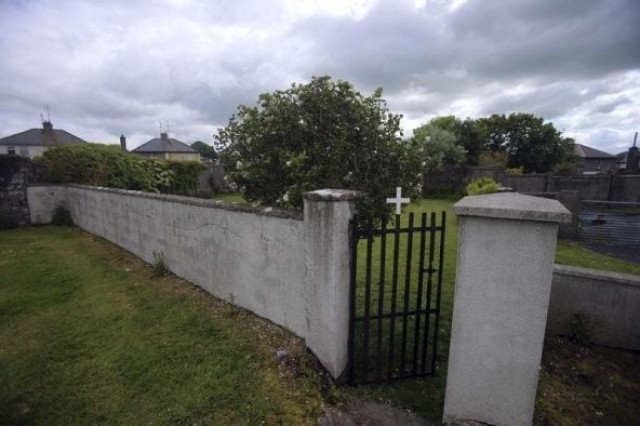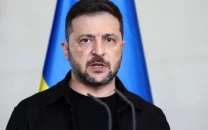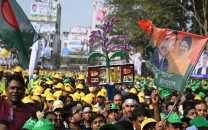Irish examining possibility of other mass baby graves
The history of 'mother and baby' homes in Ireland reflects a brutally, unforgiving response by society: Irish minister

The entrance to the site of a mass grave of hundreds of children who died in the former Bon Secours home for unmarried mothers is seen in Tuam, County Galway June 4, 2014. PHOTO: REUTERS
The announcement came as rights group Amnesty called for an urgent formal investigation into new evidence that suggests 796 children, from newborns to eight-year-olds, were deposited without coffins or gravestones, in a grave near a Catholic-run home, which operated from 1925 to 1961.
Historian Catherine Corless, who made the discovery, says her study of death records for the St Mary's home in Tuam in County Galway suggests that a former septic tank near the home was a mass grave.
Kenny has ordered his officials to "draw together a number of senior officials from across the departments until we see what the scale is, what's involved here, and whether this is isolated or if there are others around the country that need to be looked at."
During a trade visit to California, he told reporters that Dublin must decide what is the "best thing to do in the interest of dealing with yet another element of our country's past."
St Mary's, run by the Bons Secours Sisters, was one of several such 'mother and baby' homes in early 20th century Ireland.
Another such institution, the Sean Ross Abbey in Tipperary, was where Philomena Lee gave up her son for adoption in the 1950s. Her story was made into the Oscar-nominated film Philomena last year.
In a statement Thursday, the Bon Secours sisters, who ran St Mary's, said they were "shocked and deeply saddened" by the reports.
They said they welcomed Dublin's decision to "initiate an investigation, in an effort to establish the full truth of what happened."
The 'mother and baby' homes accommodated women who became pregnant outside of marriage and who were labelled "fallen women" by the unforgiving conservative Catholic society of the time.
Many of the women were ostracised from their own families and had nowhere to turn except to the homes run by nuns.
Conditions were harsh at the homes, with death records showing the children in the Tuam home died from malnutrition, pneumonia and infectious diseases.
"The history of 'mother and baby' homes in Ireland reflects a brutally, unforgiving response by society," Minister for Children Charlie Flanagan said in the Irish parliament on Thursday.
Another congregation of nuns, who ran three similar homes in Ireland, said they would welcome an inquiry into the issues surrounding the burial of babies and children in unmarked graves.
London-based group Amnesty called for a "thorough investigation" and warned the case may not be a one-off.
"As disturbing as the 'Tuam babies' case is, it must not be viewed in isolation," said Colm O'Gorman, Executive Director, Amnesty International Ireland.
"The Irish authorities must look into possible allegations of ill-treatment of women and children in other so-called 'mother and baby homes' and other institutions run by the state or religious authorities."
The rights group suggested it was possible that some of the deaths occurred at a time when the European Convention on Human Rights was in force.
"The Irish Government must not view this and other cases as merely historic and beyond its human rights obligations," said John Dalhuisen, Europe and Central Asia Programme Director at Amnesty International.
Under conservative Catholic teaching of the time, children born outside of marriage were not baptised and were therefore denied a Catholic burial on consecrated ground.
A fundraising committee has now been formed and it is hoped that a memorial will be built on the grounds with all the names and ages of the children displayed. The Bon Secours said they were "committed to engaging" with the plans.
The Catholic Church in Ireland has been rocked in recent decades by almost countless revelations of abuse and neglect at Catholic-run schools or institutions.



















COMMENTS
Comments are moderated and generally will be posted if they are on-topic and not abusive.
For more information, please see our Comments FAQ